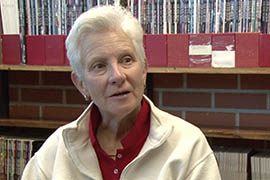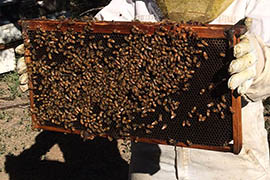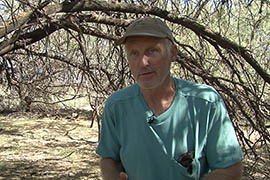- Slug: Bees-Malnutrition,475
- Photos available (thumbnails, captions below)
- Video story in YouTube
By ALEXA ARMSTRONG
Cronkite News
TUCSON – Malnutrition may play a role in a decline in bee colonies that has fueled headlines and public concern, according to experts at the Carl Hayden Bee Research Center.
Gloria DeGrandi-Hoffman, the center’s research leader, said wild colonies and those maintained by beekeepers can starve as pollen-producing plants fall victim to drought.
“Often it’s difficult for beekeepers to find areas that have sufficient amounts of flowering plants to provide enough pollen and nectar through certain times of the year to give bees the nutrition they need to stay healthy,” she said. listen
With that in mind, DeGrandi-Hoffman and others at the center are developing a protein supplement that can be sprayed as slurry but for now is being tested on small groups of bees. The next step is testing the supplement on hives.
DeGrandi-Hoffman said it’s important that bees don’t suffer from malnutrition because when they aren’t getting enough to eat their immune systems are weakened, which results in vulnerability to diseases, parasites and a compromised ability to fight off environmental toxins.
“That is my goal, to reduce these losses,” she said.
According to an article by the Yale School of Forestry and Environment Studies, it is normal for beekeepers to lose 30 percent of their bees in the winter, but last year losses reached 50 percent.
Beekeeper Denis Arp moves his bees to different parts of the state several times a year to ensure that they have access to pollinating plants, but despite those efforts he said the winters are hard. (Listen to one of his hives.)
“The general number of beehives that stay alive and healthy through the winter, it becomes an issue where our winter mortalities is higher,” Arp said. listen
And that is bad business for Arp; he makes a majority of his money by renting his hives to California for almond pollination in January. If he loses the hives he’s promised, that becomes a problem.
Arp also collects and sells honey to suppliers. But the drought has cut into that, he said.
“We produced over 200 pounds of honey last year; this year we only produced 50-60 pounds.” he said. “That maybe seems like a fair amount of honey, but really that’s not that much honey.”
DeGrandi-Hoffman said it all comes back to nutrition and the center’s efforts to provide a solution.
“Many problems we have with honey bees could be reduced if not alleviated by improving their nutrition,” she said.
^___=

Gloria DeGrandi-Hoffman, research leader at the Carl Hayden Bee Research Center, said wild colonies and those maintained by beekeepers can starve as pollen-producing plants fall victim to drought. (Cronkite News Photo by Lacey Darrow)

9-10 frames of bees can fit into bee supers, or artificial hives. (Photo by Dennis Arp)

Beekeeper Dennis Arp, said the drought has taken it’s toll on his business. “We produced over 200 pounds of honey last year; this year we only produced 50-60 pounds.” he said. “That maybe seems like a fair amount of honey, but really that’s not that much honey.” (Cronkite News Photo by Lacey Darrow)